Prescher Plumbing Service is a complex network of pipes, valves, fittings, and fixtures that distributes water and removes waste. Without it, our lives would be much more difficult.
Plumbers are experts at installing and repairing these systems. They also deeply understand the codes and regulations that govern them.
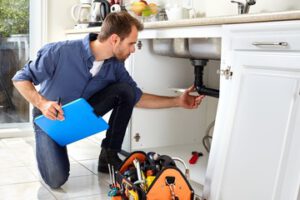
The plumbing pipes that carry water to your bathroom fixtures and drain waste into your sewage system have evolved significantly over the centuries. Different types of pipe are used for specific purposes, from the terra-cotta and cast iron pipes that were commonplace in early plumbing to today’s advanced PVC and PEX systems. Understanding the different types of pipe is important for anyone interested in plumbing, whether working as a professional plumber or doing home plumbing.
Stainless steel pipes are designed to resist corrosion and can endure chlorine disinfection. They are the workhorses of the plumbing industry and can handle both hot and cold water pressure. They are available in rigid and flexible forms and come in various sizes. Steel piping is also coated with other materials to provide additional protection from the elements. Galvanized pipe, for example, has a zinc coating that provides an external barrier against corrosive substances.
Polyvinyl chloride (PVC) pipes are versatile and affordable for plumbing supply lines. They are lightweight and resistant to most environmental damage. They are commonly found in homes and are often color-coded for easy identification.
Cross-linked polyethylene (PEX) pipes are another recent development in plumbing and have quickly become a popular option for household plumbing. They are similar to PVC pipes but can withstand higher water pressure levels over extended periods. They are also resistant to blockage and are available in various sizes.
Despite their popularity, however, PEX pipes have some drawbacks. They can be prone to leaks at the joints, and they are known to introduce polyvinyl chloride into drinking water. As such, some municipalities have banned their use for transporting drinking water. Other drawbacks include a limited range of size options and a lower resistance to heat than other pipe materials. Despite these concerns, PEX pipes remain an effective plumbing solution for most applications. They are inexpensive, versatile, and easy to install. Moreover, they can be used in both indoor and outdoor settings. They are also safe to use with most household chemicals.
A plumbing fixture is an exchangeable device that connects to a plumbing system to deliver water or dispose of waste. Examples include sinks, toilets, bathtubs, showers, and faucets. They may be installed in residential, commercial, and industrial settings. Plumbing fixtures are important because they provide clean water for washing, cooking, bathing, and hygiene.
They also play an important role in regulating water temperature and controlling flow rates. In addition, they can be used to add aesthetic appeal and style to a space. In many cases, selecting high-quality fixtures can save money in the long run by reducing repair costs and preventing leaks or corrosion.
Choosing the right plumbing fixtures requires careful consideration of several factors. A plumber must balance the client’s expectations with what is possible within the budget and project requirements. A detailed plumbing fixture schedule can streamline installation and reduce costly mistakes or rework. The schedule can also ensure that all fixtures are compatible with each other and the existing plumbing system.
Plumbing fixtures vary widely in price point and style, so examining all options before purchasing is important. A reputable designer or showroom professional can guide the selection process and make recommendations based on the client’s needs. It is also helpful to consider how the fixtures will be used to determine the most important features. For example, a frequently cooked person may prefer to invest in a kitchen faucet with a pull-out spray head.
It is also important to consider the type of water supply and pressure available for installing the fixtures. For example, a person living in a location with hard water should choose faucets designed to withstand high-pressure conditions. The same applies to areas with soft water, which can damage some plumbing fixtures.
Finally, it is important to consider the fixture’s energy efficiency and water conservation capabilities. For example, low-flow showerheads and faucets can help reduce water consumption and utility bills. Also, a tankless water heater can provide endless hot water without needing a storage tank, significantly reducing operating costs.
Almost every sink, toilet, and bathtub in your home connects to a drain pipe. The accumulated wastewater from these fixtures flows into a small curved section of the drain pipe (also known as the “p-trap”), then into a larger 4-inch pipe that runs under your house slab or basement floor to your septic tank or, in cities, to the municipal sewer system.
This plumbing-system drainage is powered by gravity, so it does not rely on pressure to flow. In contrast, the drain systems in medical facilities use active and passive pressure to move fluids.
Passive drains rely on gravity, body movement, or pressure differentials to push liquids and gases away from a wound or body cavity; active drains use intermittent or continuous negative pressure to pull fluid or gas from the area (1).
Understanding the different types of drains is important for nurses. They can help determine whether a drain is functioning as it should and help patients understand what to expect as the drainage process continues.
Drains may be surgically placed or percutaneously (inserted through the skin). In general, these devices are used for drainage from abdominal or chest injuries, abscesses, inflammatory conditions, and certain types of cancer.
Drains often require a protective covering to prevent infection or contamination as they collect fluid. These covers may be a simple plastic bag, gauze pads, or surgical strips. Nurses should carefully observe the fluid for color, consistency, and odor changes. They should also keep the drain site clean and debris-free, which can cause clogs or other problems.
While the routine use of drains in surgical oncology has decreased due to better radiological investigation and confidence in surgical technique, they remain invaluable for some patient situations. The most commonly used drains are JP, removal, and thoracostomy tubes.
When a drain is unused, the three-way stopcock should be “off” or pointing to the flush port. If it is not in this position, a nurse can accidentally flush the drain, creating an unnecessary and potentially dangerous clog. In addition, the tubing and bulb should be secured to the patient’s body so it does not dangle freely.
Although it may not be the first topic of dinner party conversation, the words “wastewater,” “sewage,” and “sewerage” are vitally important to our urban environment. Unlike household drains, which lead to cesspools or septic tanks, sewers are part of a large underground network that carries human waste and stormwater away from buildings.
A sewer system must be designed to accommodate varying loads to function properly. It must also be capable of meeting the needs of future growth and development. For example, the system must be able to handle population changes and the changing characteristics of wastewater, such as increased levels of organic matter and heavier solids.
The most common type of sewer is a combined sewer system, which carries both wastewater and stormwater runoff. The two kinds are separated at a treatment plant in this type of system. The wastewater is sent to the plant for treatment, while stormwater runoff is discharged directly to waterways.
Sewer mains collect sewage from houses and other buildings and flow into progressively larger pipes until they reach a wastewater treatment plant. The plants are often built in low-lying areas to make it easier for gravity to do its work. As the sewage is processed at the plant, it is disinfected using chemicals such as chlorine gas and ultraviolet light. The wastewater is then filtered before being returned to the environment.
Most residential home sewer lines are 4″ inside the house and then increase to 6″ up to the property line, depending on local code requirements. Sometimes, the line sizes must be larger to account for multi-family homes. A large part of a plumber’s job is maintaining these drain lines. Keeping the slope of the line correct is critical. If the hill is too steep, the line can get clogged with debris and cause overflows. A too-shallow slope can create a siphon effect and cause problems.
Because sewer work requires great skill and specialty tools, it is always best to hire a professional. Licensed plumbers can provide a range of services, from installation to repair, and are trained to deal with the potential hazards of the job.

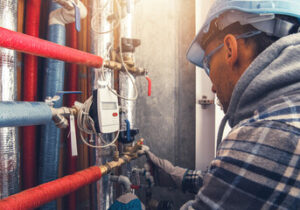 Many people find plumbers through word-of-mouth referrals from family and friends. Having a good reputation is an important factor when choosing a plumber. If a plumber is known for doing quality work at a fair price, they will often get repeat business from satisfied customers. On the other hand, plumbers with a poor reputation for cutting corners and ripping off customers will usually need help finding new clients.
Many people find plumbers through word-of-mouth referrals from family and friends. Having a good reputation is an important factor when choosing a plumber. If a plumber is known for doing quality work at a fair price, they will often get repeat business from satisfied customers. On the other hand, plumbers with a poor reputation for cutting corners and ripping off customers will usually need help finding new clients.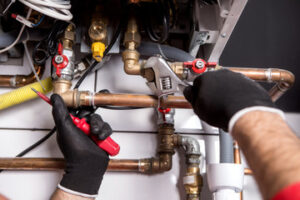 This means that it is more likely for commercial plumbing to experience issues like leaks and clogs. So what separates commercial plumbers from residential plumbers? Read on
This means that it is more likely for commercial plumbing to experience issues like leaks and clogs. So what separates commercial plumbers from residential plumbers? Read on 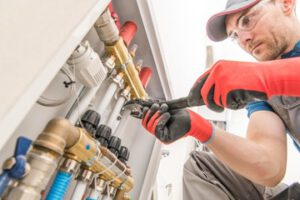 An expert plumber is a professional with extensive training and the qualifications to handle any plumbing issue. These professionals have a deep understanding of the mechanics and physics of plumbing systems and can quickly diagnose and fix any problems that may arise. They have the knowledge and tools required to repair leaks, install new pipes, and maintain the overall health of a plumbing system.
An expert plumber is a professional with extensive training and the qualifications to handle any plumbing issue. These professionals have a deep understanding of the mechanics and physics of plumbing systems and can quickly diagnose and fix any problems that may arise. They have the knowledge and tools required to repair leaks, install new pipes, and maintain the overall health of a plumbing system.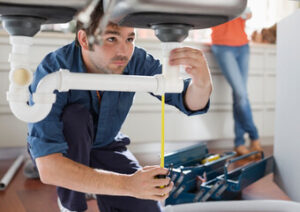 Other trenchless methods include spray lining and brush coating. Both techniques can halt corrosion in cast iron pipes and eliminate sewer gas from leaky joints. If your sewer line leaks, an expert plumber can repair the trenchless sewer. This method
Other trenchless methods include spray lining and brush coating. Both techniques can halt corrosion in cast iron pipes and eliminate sewer gas from leaky joints. If your sewer line leaks, an expert plumber can repair the trenchless sewer. This method 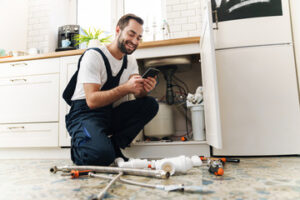 Your home’s plumbing system is a vital part of your daily life. It must run smoothly, from washing dishes at night to getting ready for work in the morning. However, it can also be prone to problems. A plumber’s job is to fix your home’s problems so that you don’t have to worry about them in the future. As a result, it’s important to choose a residential plumber who is transparent about their work and can answer your questions.
Your home’s plumbing system is a vital part of your daily life. It must run smoothly, from washing dishes at night to getting ready for work in the morning. However, it can also be prone to problems. A plumber’s job is to fix your home’s problems so that you don’t have to worry about them in the future. As a result, it’s important to choose a residential plumber who is transparent about their work and can answer your questions.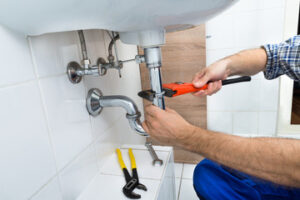
 Consider having your plumbing inspected regularly. A professional plumbing company can perform an inspection to find out if your pipes are clogged and how you can resolve the problem. An experienced plumber
Consider having your plumbing inspected regularly. A professional plumbing company can perform an inspection to find out if your pipes are clogged and how you can resolve the problem. An experienced plumber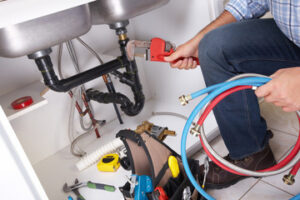 A closed loop system is one type of backflow prevention device that can prevent backflow. In a closed-loop system, waste is flushed through one hole, then out the other. A gravity feed lets liquids flow backwards through a drain line. Because solids and waste move in one direction only, this type of backflow device doesn’t create a siphon flow, which means that there is generally no risk of sewage contamination of main water supply.
A closed loop system is one type of backflow prevention device that can prevent backflow. In a closed-loop system, waste is flushed through one hole, then out the other. A gravity feed lets liquids flow backwards through a drain line. Because solids and waste move in one direction only, this type of backflow device doesn’t create a siphon flow, which means that there is generally no risk of sewage contamination of main water supply.